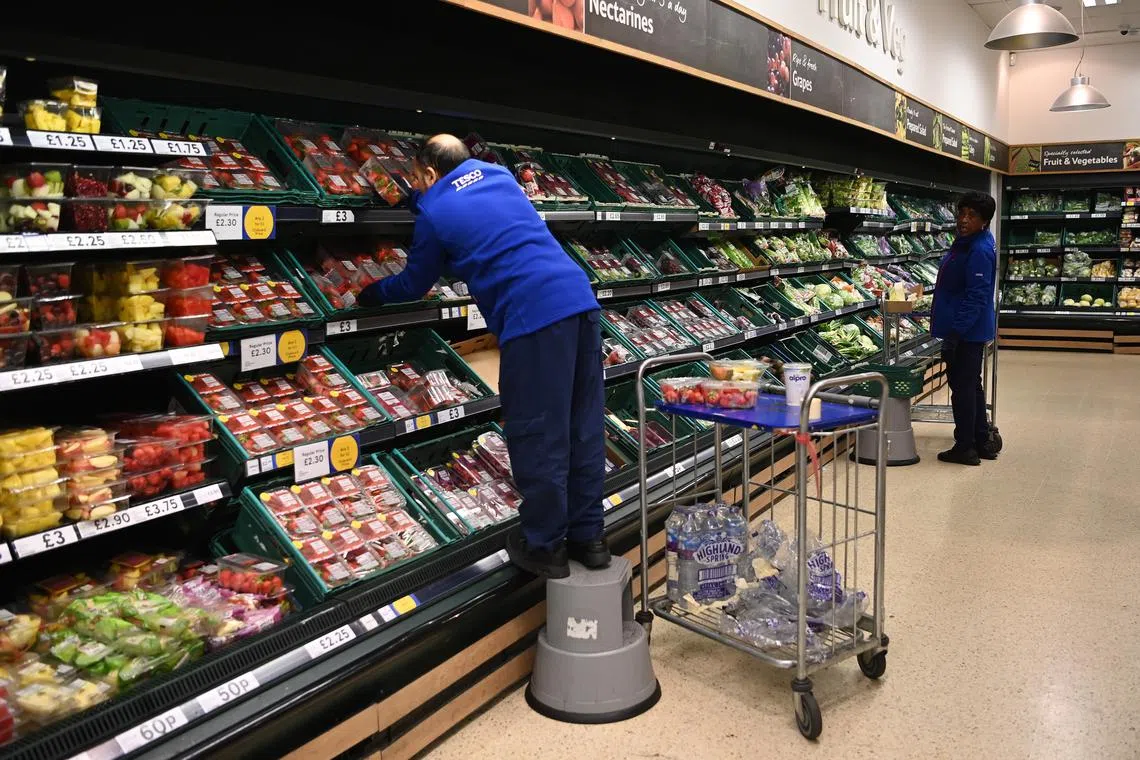UK’s planned price caps for essential food items face fierce opposition from retailers
Sign up now: Get ST's newsletters delivered to your inbox

Meat and fruit prices have risen by around 12 per cent over the past year, roughly in line with inflation.
PHOTO: EPA-EFE
Follow topic:
LONDON - The British government is working on a voluntary agreement with food sellers to cap prices of essential items
“The government is working constructively with supermarkets as to how we address the very real concerns around food inflation and the cost of living,” Health Minister Stephen Barclay told media in London.
With food and drink prices rising
However, London’s latest initiative was met with fierce opposition from retailers, with the British Retail Consortium – representing the country’s major supermarkets – claiming that the plan “will not make a jot of difference” to high food prices.
Throughout Europe, the climb in food prices remains extraordinary.
Meat and fruit prices have risen by around 12 per cent over the past year, roughly in line with inflation. But prices of bread and vegetables were up by about 17 per cent; milk, eggs and cheese by about 25 per cent; and sugar by a whopping 55 per cent compared with prices a year ago.
Several causes contribute to this outcome.
Russia’s war in Ukraine,
The wholesale price of sugar has surged to the highest level in more than 10 years, after the worst sugar beet crop in Europe for 20 years combined with poor harvests in Brazil and India.
Meanwhile, surging energy costs and widespread shortages affecting Europe’s logistics sector have contributed to sharply increased costs in processing, packaging and transportation.
Food manufacturers deny that they engage in “greedflation” by using these exceptional disruptions to increase prices more than is strictly necessary.
However, Mr John Allan, who until recently was the boss of Tesco, the market leader in grocery sales in Britain and the world’s third-largest retailer, told reporters that it was “entirely possible” that some food suppliers had been “profiteering”.
What remains beyond doubt is that price rises hit Europe’s poorest-paid most, since they devote a much higher share of their disposable income to food. The price increases also come on top of a 27 per cent hike in housing, water and energy bills across much of the continent.
Some governments continue to resist the clamour for price controls.
In Italy, the price of packaged pasta – the must-have ingredient for almost every national dish – rose by 17.5 per cent in March and 16.5 per cent in April. Industry Minister Adolfo Urso rejected demands for government intervention, claiming that “the cost of pasta may fall significantly in the coming months”.
In Hungary, where overall food inflation stood at 44 per cent over the past year, the government has introduced mandatory price controls on essential food items. Croatia, another eastern European state, followed suit.
Other European countries have taken a different approach.
Spain, for instance, has cut its sales tax on food, while Greece has taken the alternative approach of capping retailers’ profit margins.
British ministers now want to copy France’s example, where the government negotiated a looser agreement with supermarkets to offer a selection of items at the lowest possible price.
However, retailers and economics experts throughout Europe reject many of these measures as inefficient and often counterproductive.
Mandatory price controls soon result in shortages of staple items because retailers have little incentive to sell them; distribution shortages are already evident in Hungary.
And while voluntary price caps help poorer consumers, they also offer benefits to richer shoppers, who can afford to pay the full price.
If supermarkets are prevented from making a profit on essential food items, they will respond by increasing prices on other things they sell.
And because price caps must apply to all retailers, they tend to hit small family corner grocery stores hardest, since such businesses primarily sell essential items and have no hope of recouping lost revenue.
A recent World Bank report dismissed proposals for price controls on food because “they distort price signals for consumers and producers” and urged European governments to concentrate instead on targeted revenue support for those suffering most.
Facing record borrowing needs, neither the British nor the French governments can offer new financial relief to their poorest.
So, they continue talking about introducing price caps, seemingly oblivious to the fact that such measures were last tried in Europe during the 1970s, when they met with total failure.


